Table of Contents
Get started with MyPerfectResume today!
- Build a resume on any device
- Pick an ATS-friendly template
- Tailor with AI copy suggestions
Why this resume works
- Quantifies accomplishments: Measurable accomplishments like improving patient satisfaction by 20% and saving $10k in supply costs reveal the applicant’s tangible impact on healthcare efficiency.
- Showcases career progression: The applicant’s journey from medical office assistant to healthcare support illustrates their expanding roles and responsibilities, showcasing a clear trajectory of career progression.
- Illustrates problem-solving ability: Implementing systems that raised efficiency by 15% at Riverside Medical Group highlights the applicant’s problem-solving skills and initiative.
More Healthcare Support Resume Examples
Our healthcare support resume examples show how to highlight your teamwork, patient care skills, and adaptability. Use these samples to create a resume that showcases your experience and stands out in healthcare roles.
Entry-Level Healthcare Support Resume
Why this resume works
- Effective use of keywords: By weaving in role-specific keywords like “clinical support” and “patient care management,” the applicant ensures their resume is ATS-friendly.
- Puts skills at the forefront: Presenting skills such as “team collaboration” and “administrative efficiency” prominently aligns with a skills-based resume format, ideal for entry-level roles.
- Shows digital literacy: Highlighting tasks involving data entry and inventory updates showcases the applicant’s digital readiness, aligning with essential computer skills for modern workplaces.
Mid-Level Healthcare Support Resume
Why this resume works
- Includes a mix of soft and hard skills: The applicant mixes technical skills like medication management with interpersonal skills through roles in patient advocacy and team collaboration, showcasing a balanced skill set.
- Points to measurable outcomes: Quantifiable outcomes, such as increasing patient intake efficiency by 20%, highlight the applicant’s contribution to improved healthcare processes and overall effectiveness.
- Displays technical expertise: Certification in Basic Life Support emphasizes the applicant’s technical expertise essential for healthcare roles, complementing their experience in clinical support and medication management.
Experienced Healthcare Support Resume
Why this resume works
- Lists relevant certifications: Including certifications like Certified Healthcare Support and Patient Care Technician highlights a commitment to specialized healthcare expertise and ongoing professional growth.
- Showcases impressive accomplishments: Achievements such as reducing administrative costs by 10% through audits showcase impactful contributions to organizational efficiency and resource allocation.
- Emphasizes leadership skills: Training staff to boost team productivity by 15%, while coordinating seamless operations, exemplifies strong leadership skills.
Explore Even More Healthcare Support Resumes
Healthcare Support Resume Template (Text Version)
John Davis
Greenfield, IN 46142
(555)555-5555
John.Davis@example.com
Skills
- Patient Care Coordination
- Medical Records Management
- Healthcare Workflow Optimization
- HIPAA Compliance
- Medical Supply Chain Management
- Health Assessment Assistance
- Quality Improvement
- Interpersonal Communication
Languages
- Spanish – Beginner (A1)
- French – Intermediate (B1)
- Mandarin – Beginner (A1)
Professional Summary
Detail-oriented healthcare support with 6 years of experience. Expert in patient care, workflow optimization, and medical record management. Proven ability to enhance efficiency and improve patient satisfaction.
Work History
Healthcare Support
Harmony Health Center – Greenfield, IN
August 2022 – July 2025
- Improved patient satisfaction by 20%
- Coordinated care plans for 50+ patients
- Streamlined medical supply ordering, saving k
Patient Care Assistant
Riverside Medical Group – Greenfield, IN
February 2020 – July 2022
- Assisted with daily living activities for 30 clients
- Conducted health assessments, reducing re-admissions
- Developed a patient tracking system, raised efficiency by 15%
Medical Office Assistant
BrightPath Caregiving – Indianapolis, IN
January 2019 – January 2020
- Scheduled 100+ appointments weekly
- Managed patient records reducing errors by 30%
- Led HIPAA compliance initiatives, improving security
Certifications
- Certified Healthcare Support Professional – National Healthcare Association
- Patient Care Technician Certification – American Health Credentialing Institute
Education
Master of Health Administration Health Administration
New York University New York, NY
June 2018
Bachelor of Science Healthcare Management
State University of New York Albany, NY
June 2016
Browse Resume Examples by Industry
- Aviation
- Banking
- Billing And Collections
- Biology
- Boating
- Business Operations
- Casino
- Chemistry
- Child Care
- Civil Engineering
- Compliance
- Computer Hardware
- Computer Software
- Construction
- Copywriting
- Cosmetology
- Costco
- Culinary
- Customer Service
- Dance
- Data Systems Administration
- Deloitte
- Dentistry
- Driving
- Education
- Electrical
- Electrical Engineering
- Energy
- Engineering
- Entertainment
- Entrepreneur
- Entry Level
- Environmental
- Environmental Science
- Event Planning
- Executive
- Fashion
- Film
- Finance
- Fitness And Nutrition
- Food Service
- Freelancing
- General Laborer
- Goldman Sachs
- Government
- Graphic Design
- Hospitality
- Human Resources
- HVAC
- Industrial Engineering
- Information Technology
- Insurance
- Interior Design
- Inventory Management
- Janitorial
- Landscaping
- Language Services
- Law
- Law Enforcement
- Library
- Logistics
- Maintenance
- Marketing
- McKinsey
- Mechanical Engineering
- Mechanics
- Media And Communication
- Medical
- Mental Health
- Meta
- Metal Work
- Military
- Mining
- Museum
- Music
- Netflix
- Non Profit
- Nursing
- Pharmaceutical
- Photography
- Physical Therapy
- Plumbing
- Politics
- Production
- Program Manager
- Project Manager
- Psychology
- Purchasing
- Quality Control
- Real Estate
- Religion
- Retail
- Safety And Security
- Sales
- Sciences
- Shipping
- Social Services
- Special Education
- Sports
- Statistics
- Student
- Teaching
- Team Lead
- Tesla
- Training And Development
- Transportation
- Travel
- Veterinary
- Walgreens
- Walmart
- Web Development
Advice for Writing Your Healthcare Support Resume
Dive into our advice section on how to write a resume for healthcare support roles and discover tips and tricks that will help you highlight your compassion, organization skills, and dedication to patient care.

Write a strong professional summary
A professional summary on a resume introduces hiring managers to your qualifications and achievements, offering them a quick snapshot of what sets you apart. Choosing between writing a summary and an objective depends on your career stage and experience.
The professional summary is a concise section at the top of the resume that highlights your key skills, accomplishments, and work history. It’s ideal for experienced professionals who want to quickly showcase their value and expertise in their field.
A resume objective focuses more on future goals, making it better suited for entry-level job seekers, those switching careers, or anyone returning to the workforce after employment gaps. While summaries highlight “what I’ve achieved,” objectives lean into “what I aim to offer.”
Next, we’ll explore examples of both summaries and objectives designed for various industries and experience levels, including healthcare support positions. Explore our full library of resume examples for additional inspiration.
Healthcare support resume summary examples
Entry-level
Recent Bachelor of Science in Health Sciences graduate with a focus on patient care and support. Certified Nursing Assistant (CNA) with clinical training in basic patient care, vital signs monitoring, and electronic health record management. Eager to contribute to healthcare teams by assisting in daily operations and providing empathetic care to patients.
Mid-career
Healthcare support professional with seven years of experience working in fast-paced hospital environments. Expertise in patient intake procedures, coordination of medical appointments, and inventory management for medical supplies. Recognized for improving patient satisfaction scores through excellent communication skills and efficiency in administrative tasks.
Experienced
Seasoned healthcare support specialist with over 15 years in the industry, specializing in clinic administration and patient liaison roles. Proven track record of optimizing workflow processes and improving team productivity through strategic scheduling and resource allocation. Known for leadership capabilities, mentoring junior staff, and implementing successful patient engagement strategies, leading to improved service delivery.
Healthcare support resume objective examples
Entry-level
Dedicated and caring individual with a recent certification in healthcare support seeking an entry-level role to assist in delivering compassionate patient care. Aiming to use strong interpersonal skills and eagerness to learn in a supportive medical environment.
Career changer
Motivated professional transitioning from hospitality into healthcare support, bringing exceptional communication and problem-solving skills. Looking to contribute to a collaborative team by providing empathetic patient service and leveraging experience in customer-focused roles.
Recent graduate
Aspiring healthcare support specialist recently graduated with a Bachelor of Science in health sciences, eager to apply academic knowledge and hands-on training in a clinical setting. Committed to supporting healthcare professionals and improving patient experiences through attentive care.
Try our Resume Builder to make an impressive healthcare support resume. It guides you with easy steps and great templates, so your skills shine.
Include relevant certifications and training
Listing certifications and specialized training is important for healthcare support roles because it shows your expertise and readiness to handle specific tasks.
Credentials such as licenses and certifications can set you apart from other applicants by showing that you have the necessary skills and knowledge. This is especially important in technical fields where precise skills are needed. Here are a few examples of certifications for a healthcare support resume:
- Certified Nursing Assistant (CNA)
- Basic Life Support (BLS)
- Phlebotomy Technician Certification
- Medical Billing and Coding Certification
- Patient Care Technician (PCT) Certification
Creating a dedicated certifications section on your resume helps highlight these credentials clearly. This can be an enhancement alongside your education section, making sure employers easily see your qualifications. Certifications show you’re committed to learning and improving, which is key to success in healthcare support roles.
Example of a certifications section
Certified Nursing Assistant (CNA)
Issued by: American Red Cross
Expires 2025
Basic Life Support (BLS) Certification
Issued by: American Heart Association
Issued 2023
Pharmacy Technician Certification Board (PTCB) Certification
Issued by: Pharmacy Technician Certification Board
Expires 2024
Medical Administrative Assistant Certification (CMAA)
Issued by: National Healthcareer Association (NHA)
Issued 2022
Certified Phlebotomy Technician (CPT)
Issued by: American Society for Clinical Pathology (ASCP)
Expires 2026
Choose a polished and well-organized resume template that effectively showcases your skills and qualifications to stand out to hiring managers in the healthcare field.
Showcase your work experience
When applying for a healthcare support role, showcasing your work experience helps employers see what you’ve done in the past and how it relates to the job you’re applying for. Listing your experiences in reverse chronological order ensures that your most recent and relevant roles are seen first.
Start each entry with your job title, followed by the employer’s name, location, and employment dates. This format makes it easy for hiring managers to scan through your history and understand your career journey. Use clear and action-oriented language to describe what you did in each role. Focus on using strong verbs like “assisted,” “coordinated,” or “managed.”
Highlight measurable results whenever possible, such as “improved patient satisfaction scores by 15%.” Numbers make your accomplishments stand out and show potential employers the impact you had.
Including specific responsibilities can also help; tasks such as helping patients with basic care needs, maintaining medical records, or supporting healthcare staff are good examples of what might be involved in healthcare support.
Tailor this section to emphasize skills important for healthcare support roles. These might include communication skills, attention to detail, ability to work under pressure, or familiarity with medical software systems. By clearly presenting your work experience with these elements, you make a strong case for why you’re a great fit for the job.
5 healthcare support work history bullet points
- Assisted 50+ patients daily with personal care tasks, contributing to increased patient satisfaction scores by 25%.
- Collaborated with nursing staff to ensure timely delivery of medications and supplies, improving operational efficiency by 30%.
- Implemented electronic health record updates, reducing documentation errors by 40% and improving information accuracy.
- Trained new healthcare support staff in patient care protocols, resulting in a 20% decrease in onboarding time.
- Monitored and maintained medical equipment for over 100 patients weekly, ensuring compliance with safety standards.
For healthcare support roles, select a resume format that highlights your hands-on experience, relevant certifications, and adaptability in various medical settings.
Match your resume with the job description
Customizing your resume to fit the job description is important because it helps you stand out to employers and navigate through applicant tracking systems (ATS). These systems scan resumes for specific keywords from job postings, so aligning your resume can boost your chances of being noticed.
An ATS-friendly resume uses the right keywords that match your skills. Including these terms increases the likelihood that hiring managers will see your application as relevant to the healthcare support role.
To find keywords, carefully read the job posting and note any skills, qualifications, or duties mentioned more than once. Look for terms like “patient care,” “clinical assessments,” or “healthcare team collaboration,” which are often key phrases employers want to see.
Incorporate these terms naturally by rewriting parts of your resume. For example, change “Provide high-quality patient care” in a job description to “Delivered high-quality patient care to improve overall health outcomes,” which integrates the necessary keywords smoothly.
Customize your resume effectively to increase its compatibility with ATS systems, boosting your chances of landing an interview for a healthcare support position.
You can use our ATS Resume Checker to scan your resume for potential issues and receive on-the-spot feedback to improve your resume score.
FAQ
Do I need to include a cover letter with my healthcare support resume?
Yes, including a cover letter with your healthcare support resume can make a strong impression and set you apart from other candidates.
A cover letter allows you to explain why you’re passionate about healthcare support and how your skills align with the specific needs of the role.
For instance, if the organization emphasizes patient-centered care or community outreach, you can highlight any relevant experience or training in those areas.
You can use a professional tool like our Cover Letter Generator to craft a clear, concise letter that complements your resume and emphasizes your dedication to providing quality support in healthcare settings.
Lastly, reviewing cover letter examples tailored to healthcare roles can help you structure yours effectively and ensure it resonates with hiring managers.
How long should a healthcare support resume be?
For a healthcare support role, a one-page resume usually suffices to display your key skills and experiences. Highlight relevant qualifications like patient care, medical terminology, and certifications such as CPR or CNA.
If you have extensive experience or extra training in specialized areas, a two-page resume might be suitable. Just ensure every detail is job-relevant, focusing on recent roles and achievements.
Check out our guide on how long a resume should be for examples and tips tailored to your career stage.
How do you write a healthcare support resume with no experience?
Creating a healthcare support resume without experience means highlighting your skills, education, and relevant volunteer work or training that fit the job. Here are a few tips:
- Highlight relevant education: If you’ve completed courses in healthcare administration, patient care, or certifications like CPR or First Aid, list them prominently. Include the institution’s name and graduation date.
- Leverage volunteer work: Any volunteer roles at hospitals, clinics, or community health events can showcase practical experience. Describe your responsibilities and any skills you acquired.
- Focus on transferable skills: Skills such as communication, empathy, organizational ability, and teamwork are important in healthcare support roles. If you’ve honed these through part-time jobs or school projects, make sure to highlight them.
- Include a summary statement: Begin your resume with a brief statement summarizing your career goals and what makes you eager to enter the healthcare field.
Check out our guide onb crafting a strong resume with no experience for entry-level positions.
Rate this article
Healthcare Support
Share this page
Additional Resources
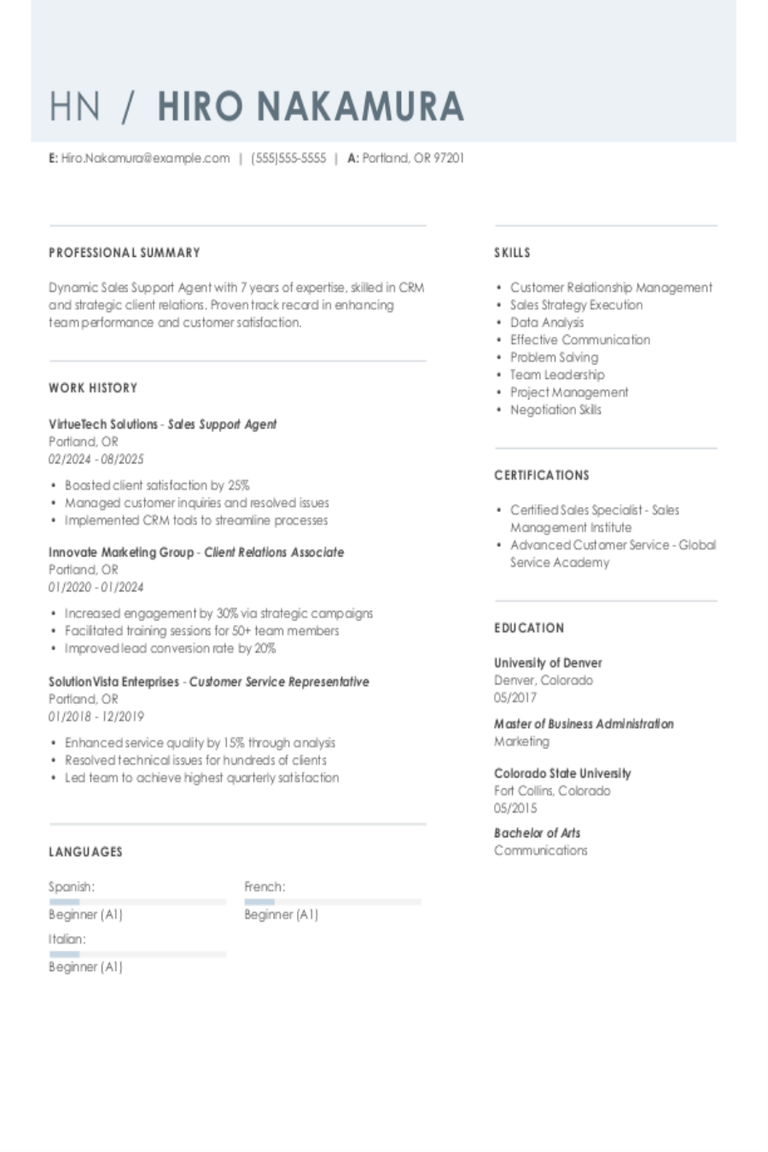
Sales Support Agent Resume Examples & Templates
Check out sales support agent resume examples that highlight key skills in customer service and sales assistance. Discover how to showcase your experience and attract the attention of potential employers.Build
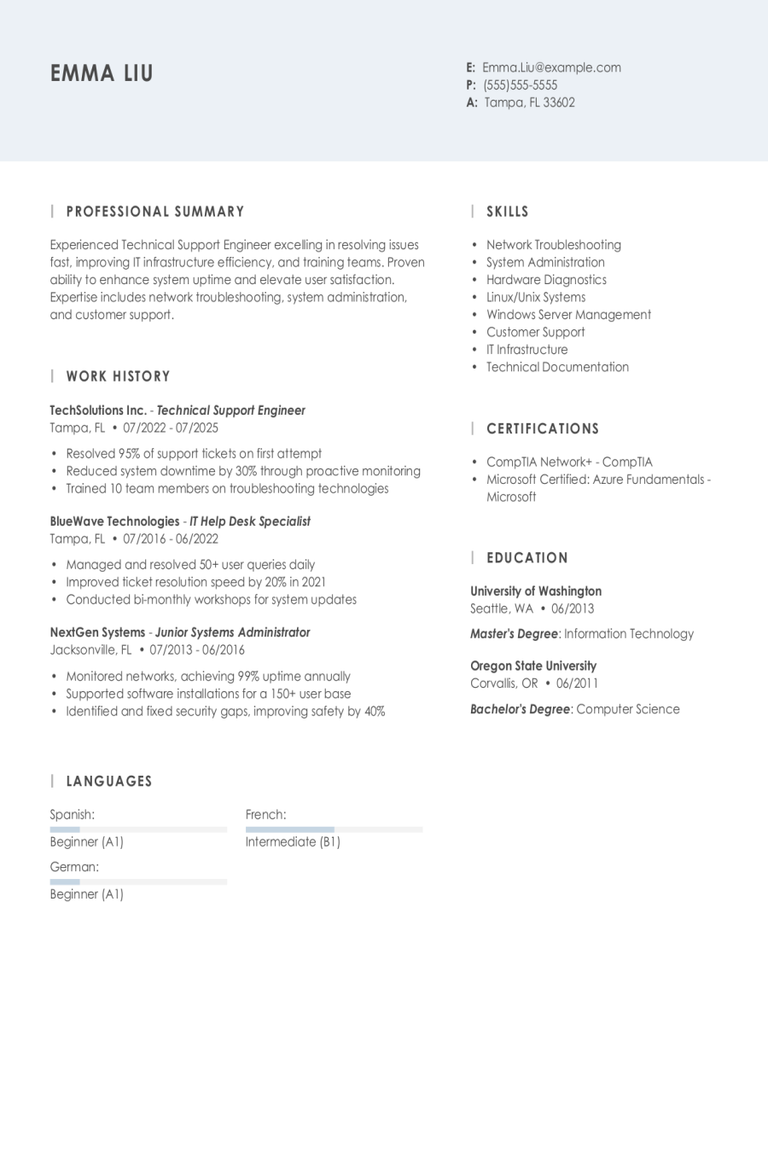
Technical Support Engineer Resume Examples & Templates
Explore technical support engineer resumes that showcase problem-solving, customer service, and tech skills. Learn how to demonstrate you’re tech-savvy and ready to tackle any issue.Build my resumeImport existing resumeCustomize this
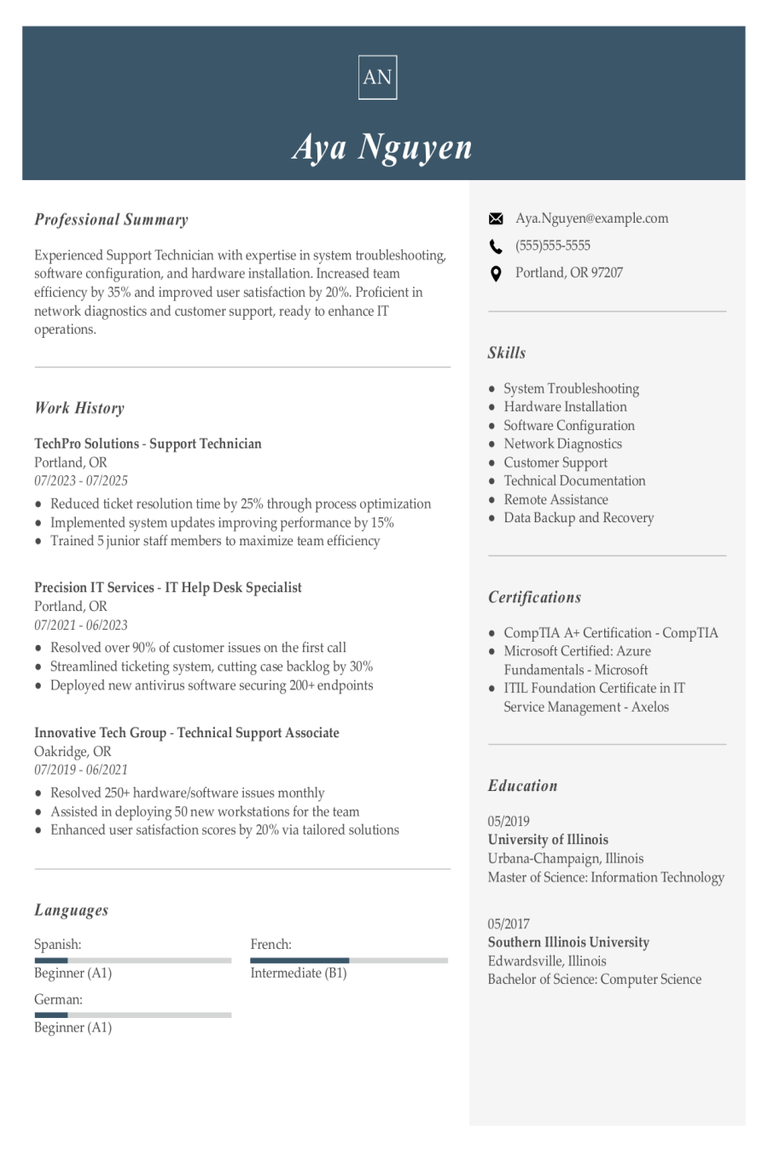
Support Technician Resume Examples & Templates
Explore support technician resume examples and tips to learn how to showcase your troubleshooting skills and experience helping customers and resolving technical problems.Build my resumeImport existing resumeCustomize this
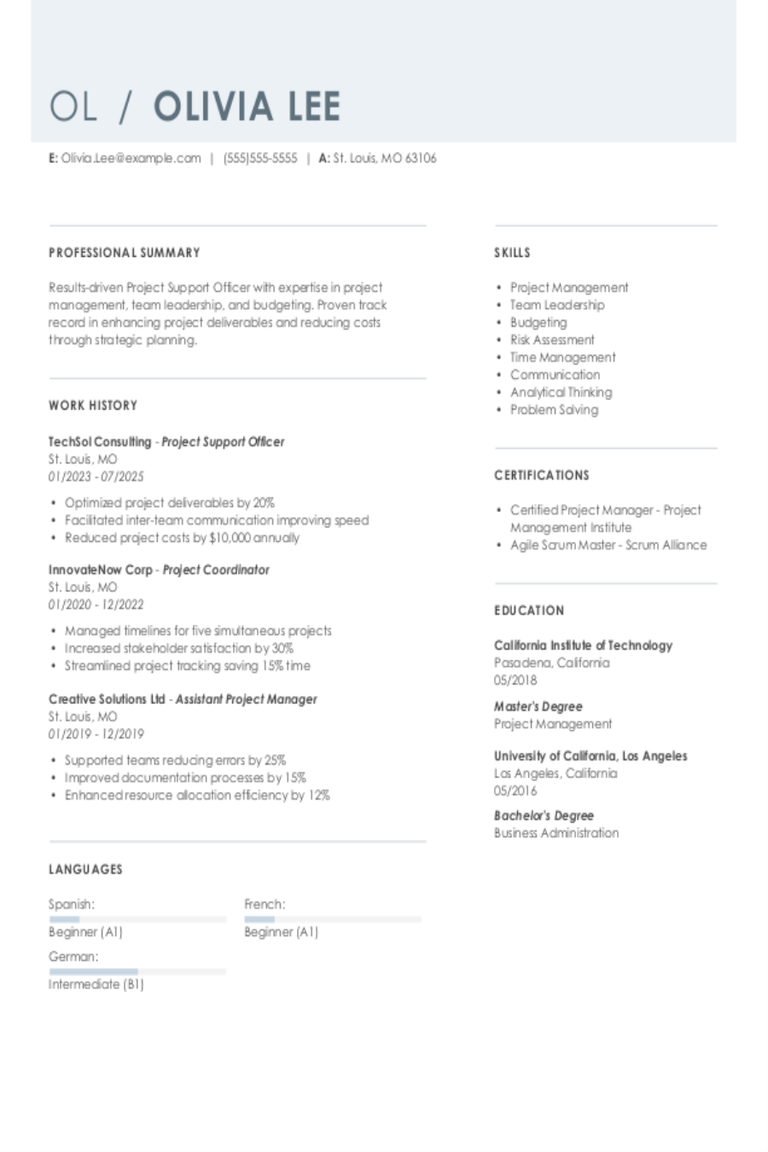
Project Support Officer Resume Examples & Templates
Explore project support officer resume examples that show how to highlight key skills like organization, communication, and teamwork. Use these samples and tips to showcase your experience in managing project

Healthcare Operations Manager Resume Examples & Templates
Discover healthcare operations manager resume examples that highlight key management skills and relevant experience. Learn how to effectively showcase your ability to streamline processes and support patient care in the
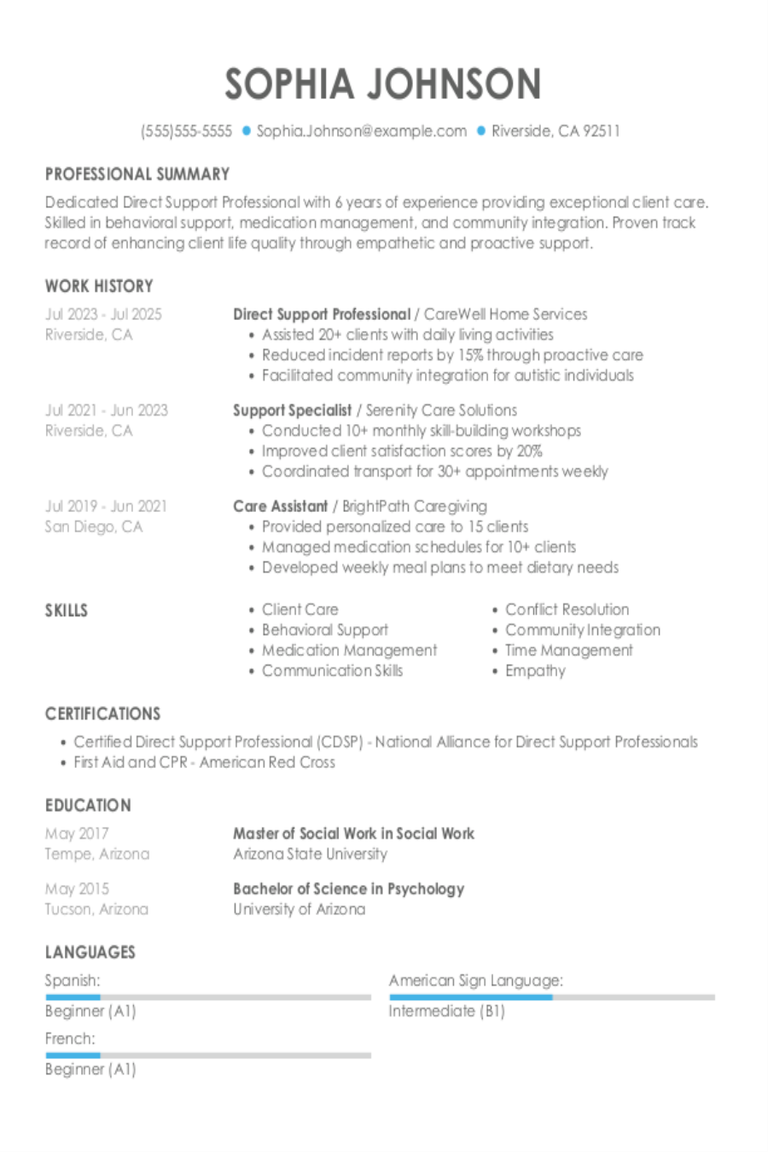
Direct Support Professional Resume Examples & Templates
Browse direct support professional resume examples and tips to learn how to showcase your experience helping with daily tasks, building strong relationships, and creating a safe and supportive environment.Build my
